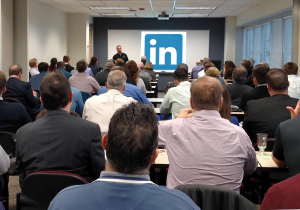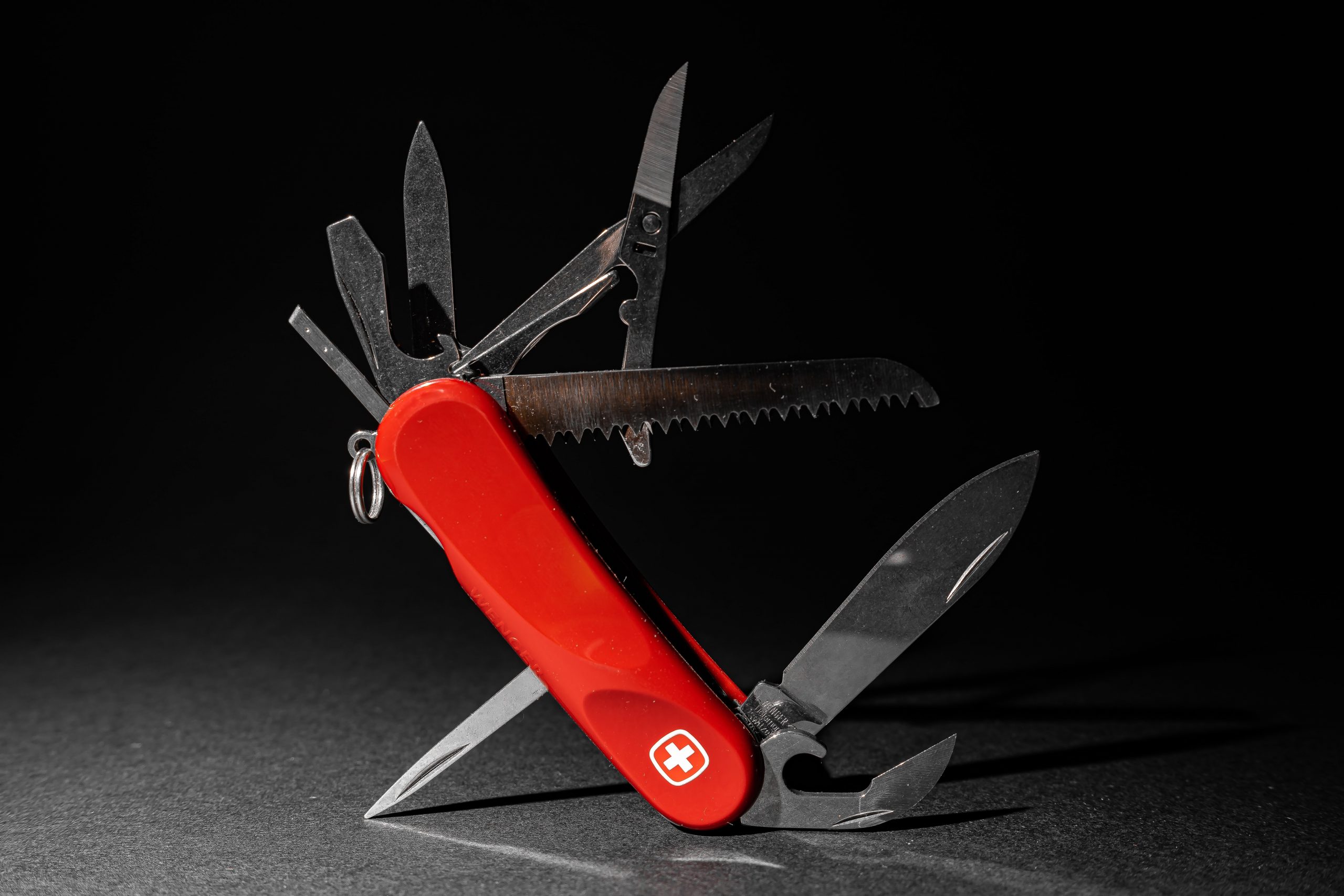Let me ask you a question. Do you feel like you're picking the right business tools to solve the right business problems?

Let me tell you a story. First and foremost, you have to know I was (and still am, a little bit) deadly afraid of wasps.
I lived in a house with a big wall that had a fireplace and mirrors from floor to ceiling. A wasp got in and I panicked. I tried to decide what was the best tool to take care of this. How about some wasp spray? It kills wasps, right? So what if it's designed to work outside and kill wasps in nests? If it works out there, why not inside? We'll come back to that story a little later.
The RIGHT Tools For The JOB
 In our businesses, we often look for business tools that are like a Swiss Army knife, when really what we need is a good screwdriver.
In our businesses, we often look for business tools that are like a Swiss Army knife, when really what we need is a good screwdriver.
Have you ever pulled out a power drill, found a bit where you could screw in a screw, and just use it for that? Well, you could. Why not? But drills can do a lot of things. They can drill holes. They can drive in screws. So why not use a power tool to do something very simple?
Well, chances are, by the time you find the right bit and you hold everything up and make it work and plug it in, you probably could have had that screw already where you wanted it.
And that's one of the things that we tend to do in business? We look for an all-in-one tool that is going to solve all of our problems. Why not? We're going to pay for it anyway? Why not get all of the different options, right?
Do One Thing Well
 I have used many of the all-in-one solutions for customers who bought them for just that reason. Things like HubSpot, which is geared more around doing marketing, and Zoho, which is more about running a business, and Salesforce, which is more about sales. All try to offer an integrated marketing approach that builds upon a CRM, scheduling, and automation tools that can do the job. But they often have cumbersome or clumsy interfaces and integrations. They tend to fall short in becoming a really perfect solution for each task or project across the board.
I have used many of the all-in-one solutions for customers who bought them for just that reason. Things like HubSpot, which is geared more around doing marketing, and Zoho, which is more about running a business, and Salesforce, which is more about sales. All try to offer an integrated marketing approach that builds upon a CRM, scheduling, and automation tools that can do the job. But they often have cumbersome or clumsy interfaces and integrations. They tend to fall short in becoming a really perfect solution for each task or project across the board.
What you need is a really good solid CRM, customer relationship manager, a scheduling app, an email marketing tool, and a project management tool. I have chosen the ones that are right for my business. I'm not suggesting that they're going to work for you as well. We each have our unique challenges and needs.
I use Nimble for my CRM because I find it simple and easy to use and it integrates with LinkedIn. I use Evernote to take notes, but I also have a ReMarkable pad that can export those notes or import them into Evernote as a PDF. Then, I use Acuity Scheduling to book my appointments. It integrates with Zoom and it even takes PayPal. Then I use ActiveCampaign to do email marketing, and I use Asana for my project management.
 Some options have all of those in one package, but I have found each tool I use to be the right tool for my needs. Even ActiveCampaign has a built-in CRM, but I'm here to tell you it doesn't offer the right solution that matches the way I work. So I wanted to find the right tool for that job.
Some options have all of those in one package, but I have found each tool I use to be the right tool for my needs. Even ActiveCampaign has a built-in CRM, but I'm here to tell you it doesn't offer the right solution that matches the way I work. So I wanted to find the right tool for that job.
I also pay every single month for the Adobe Creative Suite. It includes graphic tools, social media tools, video tools, audio tools, a whole bunch of different things. And I use Photoshop, Illustrator, InDesign, and a few other packages, but I happen to work better with other tools to do my audio and video production.
All of these tools can be integrated with other software packages, I integrate my CRM with my email, my note-taking Evernote with Acrobat, Acuity with Zoom and PayPal, my email marketing with my websites, and my project management integrates with a whole bunch of other software packages like Google Docs.
Purpose, Project, & Patience
You want to find the right tool and the right integrations to get the job done. Every tool needs three core things.
- Purpose
- Project
- Patience

Purpose
Think of purpose like this, a Swiss Army knife is a great tool when you need them, but they're designed around survival. But if you're trying to do a normal task like driving in a screw at home, why not grab a screwdriver? Getting the right screwdriver for the right type of screw and the right type of material will make the job easier and faster. If you try to use a Swiss Army knife to drive a big screw into a stud, chances are you'd break it. That's because a Swiss Army knife is not designed to deal with every situation that a screw needs to be dealt with.

Project
Projects usually have steps, and those steps can be done in a certain order to achieve success. Let's say you want to hang a picture on the wall. You have three choices. If it's really heavy, you could screw it into a stud, or you could use one of those picture hangers, which requires a hammer, or even those new 3M picture hanging thingies that have the plastic on them that you can put up on the wall. Supposedly it will hold it without damaging the wall. But the bottom line is, if your goal is to hang something, you have to be sure you're using the right technology and the right tool for the job at hand.
 Patience
Patience
Patience is all about understanding the overarching purpose of a business tool, taking the steps or hitting the milestones necessary for the project, and then waiting until everything is ready before you hang the picture, right? You wouldn't want to put in a picture hanger and find out that you didn't hit a stud. And you put the picture in and boom, it crashes down to the ground. You'll also want to make sure that you measure the wall and make sure you're putting it exactly where you want, usually in the middle, right? You have to have the patience to do every single one of those steps and make sure you're using the right tool at the right time.
Leaving… On A Jet Plane
 Let me give you an example of how that applies to business. Right now, I'm looking to take a business trip to Raleigh, North Carolina, to scope out the area.
Let me give you an example of how that applies to business. Right now, I'm looking to take a business trip to Raleigh, North Carolina, to scope out the area.
My goal is to head down to the area, meet some of my friends and just see what it's like. I want to use the right tools. And those tools would be my CRM. Who do I know who lives in Raleigh? The other one is LinkedIn. Who else can I find on LinkedIn in the area with a mutual connection?
The purpose of going down there is to research some of the communities we may want to move to. So I'm going to hopefully meet with people I already know, sit down with them, have a meal, and discuss those areas and maybe some business groups I may want to get involved with. Also, who should I get to know who are influencers in that area?
 The project is to eventually give a few speeches, so I'm reaching out to people in Vistage (I've spoken at many of those groups here in Chicago). Maybe I might get an opportunity to talk to some groups in Raleigh.
The project is to eventually give a few speeches, so I'm reaching out to people in Vistage (I've spoken at many of those groups here in Chicago). Maybe I might get an opportunity to talk to some groups in Raleigh.
I'm going to use Nimble and networking through LinkedIn to manage the connections I need to maintain and develop. If I can't book any speeches on the first trip, I can always build it up for the future.
And finally, it's going to take patience. I need to understand the fluid and flexible nature of what I'm doing. I'm trying to prime the pump and it may not work this time, but might work on trip two or three. The bottom line is I'm there to build relationships and connections to grow my business in that area.
Final Thoughts
How did that wasp story end? Well, I sprayed it, it didn't die. My wife saw what I did, screamed at me a little bit, grabbed a newspaper, whack, it was dead. She taught me a lesson that day. Sometimes the simpler tool gets the job done faster and better.
I would love to hear your thoughts on this. Comment below and share your thoughts, ideas, or questions about business tools. Have you found any business tools that get the job done well? What business tools have worked and what did not live up to your expectations? Do you have any ideas or other advice you could share?
To learn more about this and other topics on Internet Marketing, visit our podcast website at








